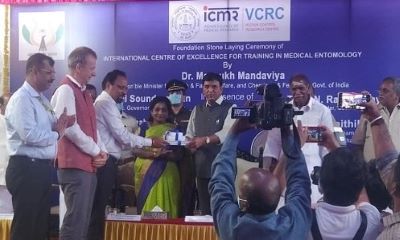HIL has set up the Bti bio-larvicide manufacturing facility at its Rasayani Plant at Maharashtra with the financial assistance of GEF/UNIDO under the project

Union Minister of Health & Family Welfare and Chemicals & Fertilizers Dr Mansukh Mandaviya during his visit to ICMR’s VCRC institute at Pondicherry on 25th June 2022 handed over the dossier and culture of VCRC developed Bti Bio-Larvicide (VCRC B17) to HIL (India) Limited, a CPSU under Ministry of Chemicals and Fertilizers.
HIL shall commercialise the VCRC Bti bio-larvicide technology and make it available to the National and State Vector Control Programmes for the control of mosquito vector. The dossier was received by HIL’s Chairman and Managing Director Dr S P Mohanty along with Shashank Chaturvedi, CGM.
The event was attended by dignitaries from Central and State Government, ICMR, NCVBDC. The event was also witnessed by the UNIDO’s Dr Rene Ven Berkel, Dr Y P Ramdev and Dr R S Sharma.
HIL has set up the Bti bio-larvicide manufacturing facility at its Rasayani Plant at Maharashtra with the financial assistance of GEF/UNIDO under the project “Development and Promotion of non-POP alternatives to DDT”. India being one of the signatory to International treaty Stockholm Convention, is committed to reduce reliance on persistent organic pollutant chemicals like DDT.
HIL is the sole manufacturer of DDT globally, which is used under malaria control programme in India and Southern African countries. Under the GEF/UNIDO project, HIL has set up manufacturing units for Long Lasting Insecticidal Nets (LLIN), Bti Bio-larvicide and Neem based botanical insecticides. LLIN is already commercialised by HIL and product is recently supplied to MoHFW. Other products shall be available in Indian markets by early next year.
On the occasion, Mohanty expressed gratitude to VCRC for the Bti technology and assured for its early commercialisation. He informed that the product is a perfect example under “Make in India” and an effort towards “Atmanirbhar Bharat” as the indigenously developed technology shall be commercialised by the Government entity for Indian market and exports. He urged the NCVBDC, the National agency under MoHFW, for early inclusion of the product in the programme so that the product can be made available to the National/State vector control programme and many other institutions like defence establishment.
HIL is associated with the National Vector Control Programme since it’s inception in 1954 and is committed to continue its support to the Government of India’s malaria elimination target of 2030.

Subscribe To Our Newsletter & Stay Updated